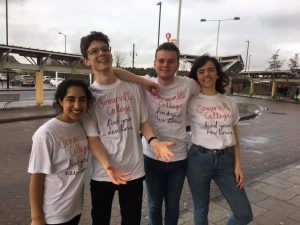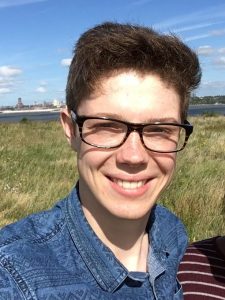Somerville’s access crowdfunding initiative has reached its first target! Thank you so much to all of you who have contributed so far. With thirteen days left to give (https://somerville.hubbub.net/p/AccessFund/), we find out what two of those involved in access projects have made of life at Somerville.
Robin Leach is in his third year reading Mathematics, and he’s the first to say that his reasons for choosing Somerville were ‘a little bit arbitrary’ (‘near to the Maths department please!’). But he very quickly found himself becoming ‘a big softie for Somerville’ and he’s loved helping out at interviews and open days, ‘talking to the bright-eyed students who were keen to get stuck into some chunky degree work.’
He wasn’t quite sure what to apply for when he was at school, nearly choosing Spanish, but eventually plumping for Maths simply because it interested him the most. Now, he’s specialising in Pure Maths. ‘The focus is on producing the framework for developing methods,’ he says, and he emphasizes that at university, ‘it’s no longer a case of being given a method and told “use this, trust us, it works”: every result we use we first derive’. For Robin, it’s a much more satisfying way to do things than Maths at school, and he also finds that he enjoys revision, giving him the chance to slot things into place ‘and actually feeling like I know some things.’
Robin finds tutorials ‘invaluable’, but also admits they’re still ‘a strange experience’: ‘Suddenly, you’re in a room with one or two other students and an expert in the field, with the opportunity to probe and prod at different areas of Maths. It can make you feel a bit thick on occasions, but I think that’s the effect of discussing a problem with someone who is so learned in the topic, because it sort of takes away the context of how difficult what you’re studying actually is.’
And what about his tutors? ‘They’re a really top-notch gang,’ Robin says. ‘That was something that particularly struck me when I came to interview in sixth form and was confirmed when I arrived here to study. The tutors are really friendly and wholeheartedly have your best interests at heart. They’re flexible, cool, helpful and keen to get the best out of you, and that’s excellent. When I came to interviews I had big misconceptions about what they were going to be like. I pictured going into a lion’s den, and the tutors trying to trick you and make you stumble, but in reality they are encouraging and just want you to do well.’
So what’s next for Robin? ‘I’m still very unsure about the direction of my life,’ he says. ‘I have toyed with the idea of doing further study, but I think I’m coming to a point where I’d like to go in a bit of a different direction and leave education for a bit. This summer I’m going to be interning at a software company in London, which will hopefully tell me whether I’d like to go into programming, as that’s something I’m very much considering at the moment.’ He admits, though, that he is still ‘heavily aimless, just as in school, but this time with a bit more reassurance that that’s not a huge problem.’
For Emily Louise, still only in her first year at Somerville, the choice of what to study was clear from the start. ‘History was my favourite subject at school,’ Emily says, ‘and I was always in interested in my personal History: History from a bottom-up perspective.’ Taking part in two summer schools confirmed her decision and gave her the confidence to apply. ‘I did the UCL Summer Challenge in which one seminar was based entirely on protest songs as sources. It was something that I never would have considered in the classroom, but it’s had such significance historically.’ Then, on the Sutton Trust Summer School, she found herself debating the place of History as an academic discipline, ‘and knew that studying History would be something I could enjoy.’
Emily has found the biggest different between school and university to be that of sheer speed. ‘You’ll have an esasy about a topic you’ve never touched one week and move onto something completely different the next. There’s also a bigger emphasis on historians and their different perspectives rather than a set interpretation of an event as many school textbooks provide.’ So how is she adapting to weekly essays and mammoth reading lists? ‘I’m not sure you ever get used to it!’ Emily says, but she’s learned to focus her reading and be selective ‘rather than sloping through something and finding myself with no useful notes hours later!’.
Her favourite essay so far has been ‘To what extent is national identity gendered?’, written for the ‘Approaches to History’ paper: ‘I’m really interested in contemporary politics and ideologies so taking a historical perspective on how national identity is formed and whether it has historically been gendered was enjoyable. Coming out of this, I found Margaret Higonnet’s Behind the Lines: Gender and the Two World Wars a particularly interesting read. It explains how and why women held nationalistic and patriotic views, particularly in times of war and even when they faced significant restrictions.’ Though Emily sees herself as a modernist, she’s also enjoyed the chance to study some medieval history with ‘the famous Benjamin Thompson’ (‘I’m amazed by how many books of maps and family trees he manages to store in his office!’).
It’s early to be thinking about what might come after her degree, but as the JCR’s Access Officer, Emily says she already has ‘a really big interest in access and education policy’ and is starting to think about the career routes that might come out of that. She’s also interested in law, and especially in tackling inequality in terms of access to legal representation. But for the moment, it’s back to those essays…


